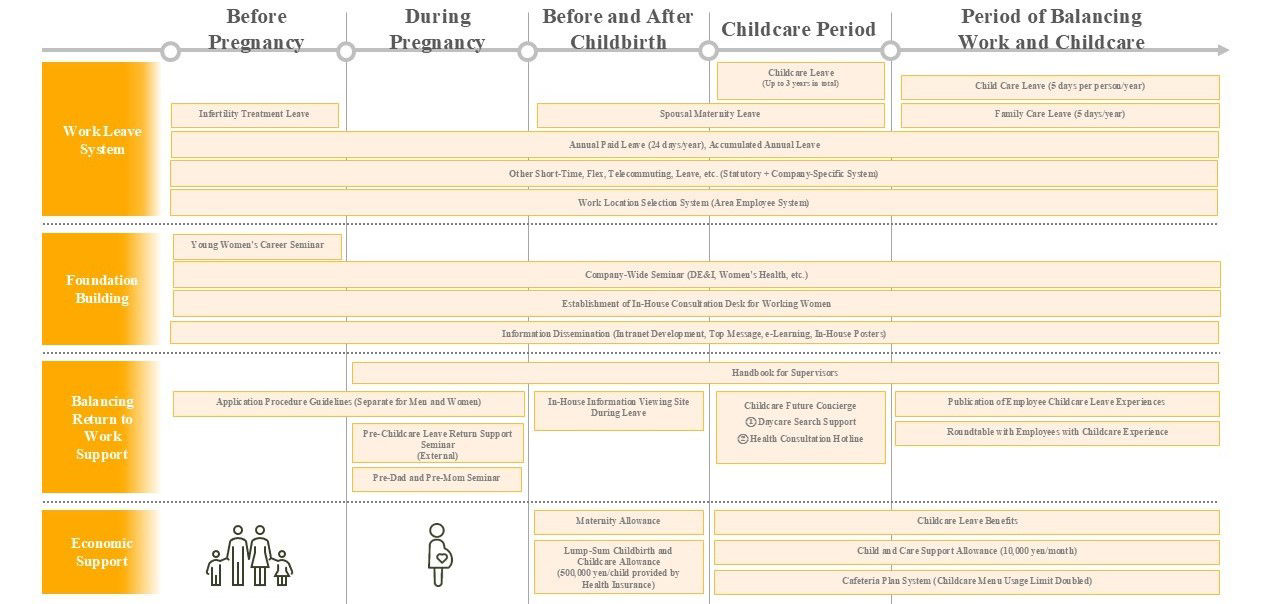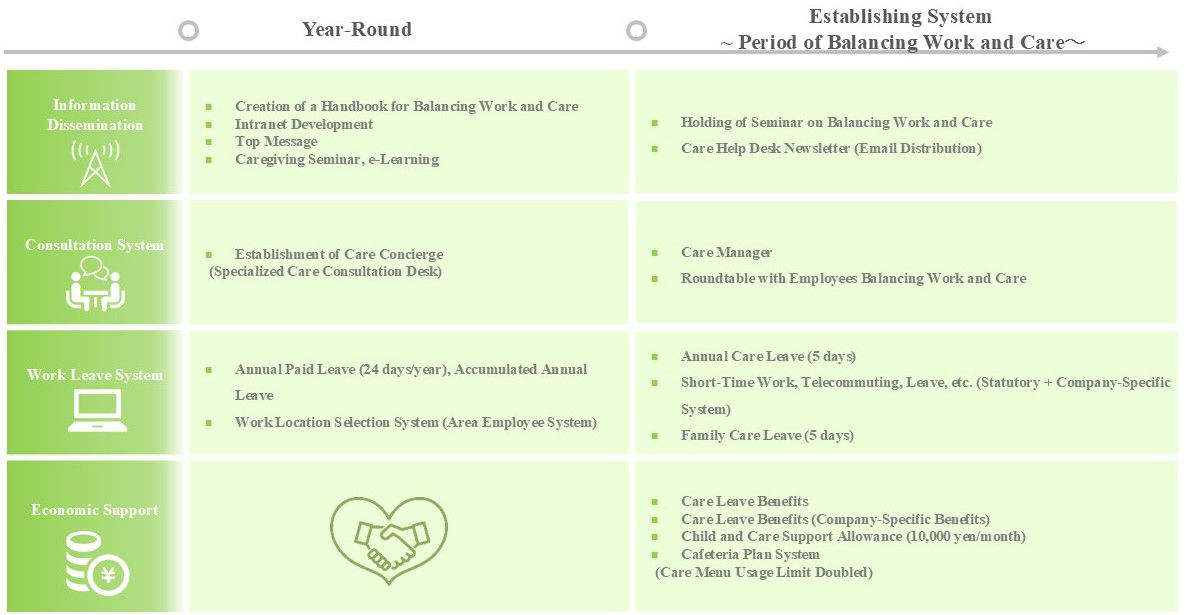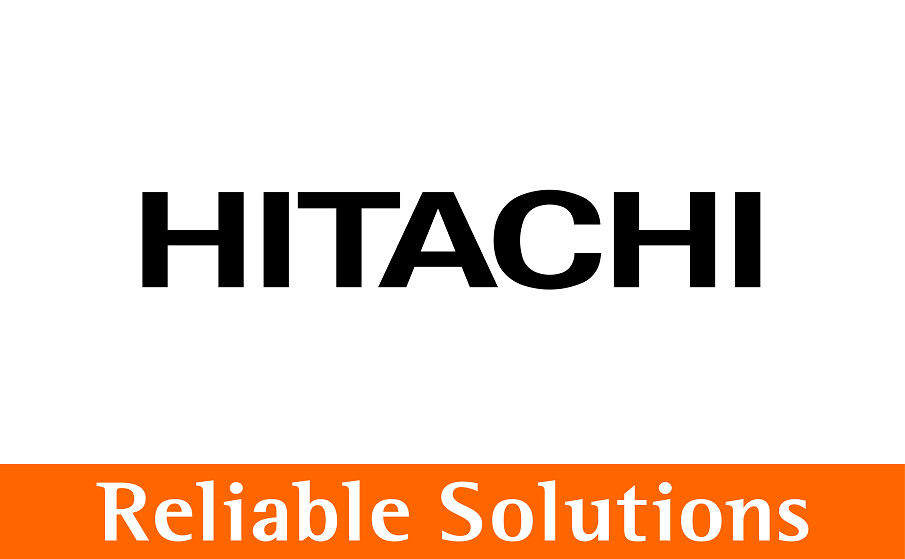Developing Diversity
Developing Diversity, Equity & Inclusion
Policies and systems for promoting Diversity, Equity & Inclusion
In 2010, Hitachi Construction Machinery formulated the 2020 VISION. The vision outlines the goal of achieving an ideal organization in 2020 whereby Hitachi Construction Machinery and its employees are a ‘close and reliable partner’ anywhere on the earth with best solutions through Kenkijin Spirit. It is essential that we develop businesses by drawing on new strategies and novel ideas, rather than relying on the same ideas and strategies employed thus far, so that we can fulfill our vision, become recognized internationally as a true global company, and be a successful contender in the market.
To this end, we value respect for diversity and recognize the values and uniqueness of each of the employees that supports our businesses, regardless of race, nationality, gender, age or other characteristics※. In line with this recognition, we have positioned diversity as one of our key management themes. In April 2011, we established the Diversity Promotion Group. The group has undertaken measures to find solutions for five themes for the promotion of diversity in the Hitachi Construction Machinery Group—Building a foundation for diversity, work style reforms (work, life, and management), supporting the participation of women and minorities, supporting the activities of national staff, and globalization of Hitachi Construction Machinery in Japan. From FY2016, these activities have been taken over by and are continuing to be implemented by the Human Capital Department.
In addition, the importance of respecting Diversity, Equity & Inclusion (DE&I) is conveyed to employees through various rank-specific training and other venues. And the verification of the planning and progress of these activities is being handled by the Human Resources Strategy Committee, which is attended by senior management.In the medium-term management plan launched in fiscal year 2023, strengthening people and organizational capabilities has been positioned as one of the core pillars of our human resources strategy. Within this framework, we are continuously advancing DE&I initiatives from both cultural and institutional perspectives. As of now, Hitachi Construction Machinery alone employs approximately 95 non-Japanese staff members, including individuals from China, Indonesia, Brazil, and the Philippines.
※ We will respect individual human rights in the recruitment and treatment of employees and during all other company activities. We will not engage in any acts that may impair individual dignity or discriminate on bases such as sex, sexual orientation, age, nationality, race, ethnicity, ideology, belief, religion, social status, family origin, disease, disability.
(Source: Hitachi Construction Machinery Group Codes of Conduct)
《 Supporting women’s participation and advancement 》 Formulation of action plans to promote women’s participation and advancement
Under the Group Global DE&I Policy, Hitachi Construction Machinery divides domestic measures for promoting women’s participation and advancement into three categories: (1) building a foundation for women’s participation and advancement, (2) continuous employment / reinstatement support, and (3) career development support.
The percentage of female workers within Hitachi Construction Machinery (non-consolidated basis) overall workforce is small. For this reason, we are working to increase the number of female employees, which includes hosting employment seminars specifically for women and handing out pamphlets in order to promote the more active hiring of women. and handing out pamphlets in order to promote the more active hiring of women.
And efforts are being made to improve the workplace environment to support the active participation of women in manufacturing settings. In addition, with the aim of creating an environment where work and childcare can be flexibly balanced according to the wishes of the individual, regardless of gender, we encourage reinstated employees to participate in reinstatement support seminars and introduce “Childcare Mirai Concierge、a nursery school matching service)”. We are also focusing on supporting employees in balancing work and caregiving responsibilities. In fiscal year 2024, we introduced the “Caregiving Concierge,” a specialized consultation service provided by care managers and other professionals, to help employees facing caregiving challenges continue working with peace of mind. Under a flexible work system, we are developing an environment that makes it easier to balance work and caregiving.
Going forward, we will continue to promote the development of a workplace environment where diverse talent—including women—can maintain high motivation and continue working while balancing their careers with life events.


List of Childcare Support Initiatives(Upper section)
List of Caregiving Support Initiatives( Lower section)
《 Work-Life Management 》
Initiatives for Work Style Reform
The Hitachi Construction Machinery Group complies with laws and regulations related to working hours applied in each region, takes into consideration work-life balance, and makes efforts to curb overworking.
Hitachi Construction Machinery (non-consolidated basis) has set targets to reduce the number of overtime hours and to increase the number of days of annual paid leave taken every year. In order to achieve these targets, we conduct monthly performance distribution and enlightenment activities such as posting in-house posters. (Target for FY2023: Average monthly overtime hours within 20 hours, average number of days of annual paid leave exercised 17 days or more, etc.)
In the context of work style reform, in addition to correcting long working hours, it is also necessary to address individual circumstances aimed at maintaining and promoting the health of workers, as well as enabling diverse human resources to thrive.
The Hitachi Construction Machinery Group is working to create a comfortable and dynamic work environment that further utilizes human resources with various values, while ensuring that each and every employee can use their limited time to the maximum effect.
And we share our basic idea about working style, “While emphasizing real communication, we will successfully integrate conventional working styles and new methods to further improve work efficiency and create new value.” By fusing conventional work styles (sharing company-wide / departmental goals, thorough goal setting / progress management) with new methods (business reforms utilizing digital tools such as remote meetings and RPA), we are working to further improve operational efficiency and create new value. In addition, we will continue to promote improvements in the employment environment and carry out reviews of office layout and introduction of a free-address system, along with introduction of teleworking (working from home or a satellite office) to achieve more flexible work styles.
Furthermore, in order to provide a comfortable working environment for employees in indirect departments who support the production sites, we are promoting the improvement of work environments that are suited to the actual conditions of each factory and workplace. New buildings designed according to their respective concepts have been completed and are now operational at the Tsuchiura Factory (Tsuchiura City, Ibaraki Prefecture), the Ryugasaki Factory (Ryugasaki City, Ibaraki Prefecture), and the Banshu Factory (Kakogun, Hyogo Prefecture).
System to support balancing work and home life
Hitachi Construction Machinery is expanding various systems in order to support a balance between work and home life. We are engaging in improvements to create an environment that is easy to work in. We are supporting employee work-life management by introducing a work system that is easy to utilize, and a leave system for childbirth, childrearing, care-giving and nursing.
Childbirth and childrearing
- Maternity leave
Leave provided to women for the purpose of giving birth (8 weeks before childbirth plus 8 weeks following childbirth) - Leave for childbirth of spouse
Leave for purpose of accompanying spouse during and after childbirth (5 days total) - Childcare leave
A leave system for caring for children until the completion of the 3rd grade of elementary school (up to a total of 5 days). - Reduced working hours for childcare
A system of reduced working hours for the purpose of raising children (for the required period up until the child graduates from elementary school) - Child and caregiving support allowance
10,000 yen/month is provided for each dependent relative.
Caregiving/Nursing Care
- Caregiving leave
A system of leave for the purpose of providing care to someone who requires it (total of 1 year or less) - Reduced hours of work for nursing care
A system of reduced working hours for the purpose of providing nursing care to someone who requires it. (for the required period until the care is no longer required) - Family-Care Leave
A system of leave for the purpose of providing care for a family member who requires it (total of 5 days or less) - Child and caregiving support allowance
10,000 yen/month is provided for each dependent relative.
Other support systems
- Flexible working hours
- Telecommuting (working from home, working from a satellite office)
- Half-day leave
- Leave for transfer of spouse overseas
《 Supporting the activities of national staff 》 Accelerating the participation of human resources from overseas
Various departments in the Hitachi Construction Machinery Group accept employees from overseas Group companies. This initiative was fully launched in 1996, and approximately 300 people have worked in Japan up to now. By proactively taking in diverse overseas personnel and expanding their opportunities we aim to improve the performance of the organization.
《 Social inclusion 》
Initiative to promote the employment of people with disabilities
As of June 1st, 2024, the ratio of people with disabilities working at Hitachi Construction Machinery in Japan was 2.45% of total headcount. This is lower than the ratio designated by law (2.5%).
For the purpose of exceeding the ratio designated by law, we have started implementing some new initiatives, such as hiring more people with disabilities in departments that previously had had no employees with disabilities. In preparation for the revision of the legal employment rate in July 2026, we will promote the creation of the fields where every Kenkijin can be themselves in Harmony regardless of whether they are disabled or not.
Supporting Employment of Older People
Hitachi Construction Machinery offers reemployment to anyone who has reached the retirement age of 60 and desires reemployment. We offer life plan training and pre-retirement interviews as support activities to help older people make the best use of the career they have built up over the years. We also promote the creation of a workplace in which diverse employees can reach their full potential.
LGBTQ support
We employ human rights and management training to ensure employees have an accurate understanding of LGBTQ (lesbian, gay, bisexual, transgender and Questioning) individuals. In doing so, we are working to achieve a work environment in which each individual respects one another, does not violate individual rights and finds it easy to perform their work. Hitachi Construction Machinery is also expanding some systems based on the idea of respecting employees who have same-sex partners, and will continue to work to make our company where everyone can play an active role.
B-BBEE Initiatives in South Africa Policy
As Hitachi Construction Machinery expands its business in South Africa, it pursues activities aligned with the country’s Broad-Based Black Economic Empowerment (B-BBEE)*1 policies to create employment and economic development. As of the end of April 2024, Hitachi Construction Machinery Southern Africa achieved a Level 2 rating in the B-BBEE evaluation. In fiscal year 2025, we will continue to engage in activities aligned with this policy, striving to contribute to local communities while ensuring the sustainability of our business.
*1 B-BBEE: Companies and organizations in South Africa are scored on their B-BBEE initiatives and contributions and rated on a scale from level1 (highest) to 8 or as being “non-compliant.”

